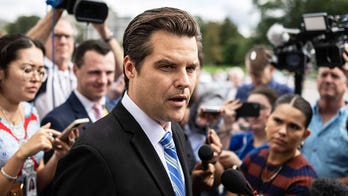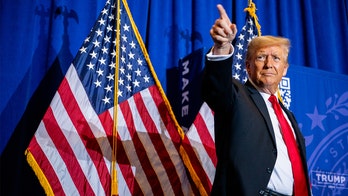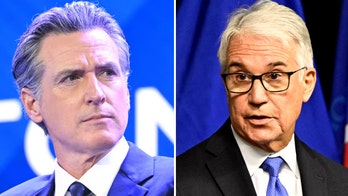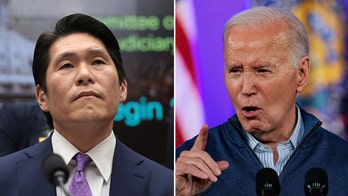A few weeks ago, White House Press Secretary Jay Carney said President Obama didn't want to take a "toll booth" approach to keeping the government open every few weeks.
If that's the case, how does one avoid a government shutdown?
Buy an E-Z Pass.
Drivers who take the New Jersey Turnpike, the Dulles Toll Road, the Ohio Turnpike, the Holland Tunnel and the Tappan Zee Bridge in New York know exactly what having an E-Z Pass means. Drivers pre-pay money onto an E-Z Pass account. Then when they hit a toll booth, they can speed on through as the E-Z Pass cartridge mounted to their dashboard, which immediately deducts the toll.
For now, the federal government has no pre-paid E-Z Pass. Which is why every two or three weeks, the government hits another toll plaza along the Fiscal Year 2011 thoroughfare and needs to sling a few more quarters into the basket to keep driving toward September 30. That's where the FY '11 road ends and intersects with the FY '12 federal cloverleaf, starting the entire spending process over again.
And for now, House Republicans, Senate Democrats and the Obama Administration can't agree on how much they should spend on this fiscal road trip.
So, they keep arriving at toll booths. The next mile marker comes March 19. And if Washington doesn't pay, it can't keep driving down the freeway, which would trigger a government shutdown.
House Appropriations Committee Chairman Hal Rogers (R-KY) unveiled the latest fiscal installment plan Friday. It's a roadmap that funds the government through April 8 and slashes $6 billion in spending. Cuts include money already on the chopping block for the Corporation for Public Broadcasting, a National Park historic fund and unused dollars for the 2010 Census.
The House plans to pull up to the next toll plaza Tuesday. But there's a rebellion brewing among tea party freshmen and conservatives who have had it with expressway spending measures.
This is where turnpike politics merges with a fabled child's game.
"We can't continue to kick this can down the road," said freshmen Rep. Allen West (R-FL), who will vote no on another stopgap spending package.
"Conservatives are all about stopping kicking the can down the road," said sophomore Rep. John Fleming (R-LA). "I think it's time to do that now."
What's interesting is that President Obama and Senate Democrats are not the exclusive targets of those who are restless in Republican ranks. Some in the GOP are starting to turn their attention to the GOP brass.
Fleming says a number of his constituents tell him they are ready for a "showdown" over spending, rather then the tollbooth strategy that keeps the government operating. Of course a "showdown" approach could result in a "shutdown."
"You can eat the elephant one bite at a time and that may be the way to do it," Fleming says. "But I think the burden of proof is on leadership to convince us that we shouldn't put this off any longer. My constituents and the American people are ready to get this resolved once and for all."
Allen West says voters turned out former Rep. Ron Klein (D-FL) in favor of him last fall because they demanded that someone take a "stand." And West echoes Fleming when he describes the tollbooth as "confusing" to the public.
"Just when they think this thing is over they hear that in another two weeks you have to come back and do it again. And then in another two weeks you have to do it again. That's what's causing them to lose their belief that we can resolve the problems," West said. "What's we're doing is appalling."
A number of freshmen and conservatives indicated they would likely vote no on another short-term extension. In fact, some freshmen who represent swing districts but have strong ties to the tea party waffled when asked how they might vote for fear they might run afoul of leadership. A few freshmen even deployed the chestnut of "I want to see what's in the bill first" as an effort to deflect questions about how they might vote when the legislation comes to the floor in a few days.
Plus, there's another issue. Reps. Michele Bachmann (R-MN) and Steve King (R-IA) are urging Republicans to vote against any future Continuing Resolutions (known in Congress-ese as a CR) to run the government on an interim basis unless GOP leaders meet one key demand.
"We will vote no on any CR that does not include language that shuts off the automatic funding of ‘Obamacare' and funds ‘Obamacare going forward," said King.
During votes Friday, Bachmann deployed a squadron of aides to stand outside the Speaker's Lobby. Each was armed with alphabetized envelopes to hand to each Republican member. Inside the envelopes were "Dear Colleague" letters, asking their GOP compatriots to vote no on a future CR unless the leadership repealed the health money.
House Republican leaders claim it's against the rules to claw back the funding in the manner that Bachmann and King want. In fact in mid-February, the House Rules Committee refused to make in order an amendment by King to carry out his plan, saying his method wasn't proper.
But King describes that as "a straw man argument."
"I'm willing to imperil the CR and I'm not backing up from that," said a defiant King.
So, could this blow up the CR?
That's doubtful. There are certainly a number of freshmen and conservatives who are ready to split from leadership. The Bachmann/King effort will also influence a few Republicans to vote no, too. And then there are Democrats. Wanting finality, House Minority Whip Steny Hoyer (D-MD) says this will be the last CR he'll endorse. Other Democrats will vote no because they don't like the cuts. So there's a chance this scenario could create a perfect potion to doom this legislation.
Which is why the GOP whip operation canvassed lawmakers Friday to see where they might stand on the new CR.
But even that is a delicate enterprise. The office of House Majority Whip Kevin McCarthy (R-CA) was careful not to describe their check-ins with members as a conventional whip effort. In other words, the need to conduct a formal whip could signal that the legislation is in trouble. Instead, McCarthy's office described Friday's outreach as just a way of staying in "constant contact" with the rank-and-file and "taking the temperature."
Of course, a failure to really know where the membership stands could produce a worse outcome. The GOP leadership is still stinging from an embarrassing vote last month where lawmakers defeated a bill to reauthorize portions of the Patriot Act. A rejection of a CR would be more serious and undoubtedly roil the financial markets.
So no one is taking anything for granted. Especially when many lawmakers are wrestling with how they'll vote at the next toll booth.
"I have mixed emotions," said freshman Rep. Steve Southerland (R-FL) when asked whether he could support the new bill. "I'm just not there yet."
Southerland describes the repeated efforts of trimming $2 billion in spending a week on the CR's as "throwing an ice cube at the sun." Especially when lawmakers approach the triple-witching hour of passing a final bill to fund the government this year, approving a budget for next year and voting on raising the ceiling that limits how much debt the U.S. can incur.
"It's like air traffic control, trying to land these three big planes at one time," said Southerland of the looming trifecta. And in just his second month in office, Southerland, like many freshmen, say he's not sure he has all of the answers yet.
"I'm new. I'm still trying to figure out the floor plans. It's still like, where do you get a coffee around here?" Southerland asked with a laugh.
Perhaps Southerland can get a coffee at the next toll plaza. Which is precisely where the House of Representatives is scheduled to arrive next Tuesday in its latest effort to drive down the Fiscal Year 2011 superhighway.




